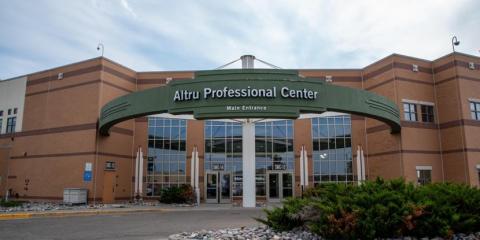A concussion is a traumatic brain injury caused by intense shaking of the brain. This can happen because of a blow to the head or neck during sports, a fall or whiplash from a car accident. A violent impact to the head may cause the brain to move around and hit the inside of the skull, resulting in brief disruption to normal brain function and causing a variety of physical and cognitive symptoms.
Concussions can be serious, and swift diagnosis and treatment are crucial. At Altru Orthopedics & Sports Medicine, orthopedic surgeons, sports medicine specialists and other providers follow evidence-based concussion management protocols and offer complete concussion management treatment options.
Concussion is a common sports injury, which is why Altru partners with community medical providers, local schools, athletes and parents to provide education about preventing and identifying concussions. When a concussion occurs, the goal of concussion evaluation and management is to diagnose the injury swiftly and provide evidence-based treatment to help patients return to sports, work or favorite activities.
What are the Symptoms of a Concussion?
Concussions are common in youth sports, including football, soccer and basketball. Student athletes who sustain a concussion may report a variety of symptoms, including:
- A feeling of pressure in the head
- Difficulty concentrating
- Dizziness
- Headache
- Nausea
- Sensitivity to light and/or sound
- Blurry or double vision
- Disorientation
- Feeling sluggish
- Memory problems
- Neck pain
- Vomiting
Coaches, parents, teachers or referees may notice student athletes displaying the following symptoms:
- A dazed or stunned appearance
- Clumsy movements or balance problems
- Forgetfulness or difficult recalling information
- Delay in answering questions
- Changes in behavior or personality
- Confusion
- Loss of consciousness
How is a Concussion Diagnosed?
Concussion symptoms aren’t always present right after the injury occurs. They may take days or weeks to appear, which can make concussions difficult to diagnose. The first step is recognizing symptoms when they occur and seeking a medical evaluation promptly.
A medical provider will ask for a description of the injury and any experienced symptoms. The provider will conduct a physical exam and a neurological exam, which includes checks of the person’s balance, reflexes and vision, and he or she may test memory and cognitive ability. In rare cases, a CT scan or MRI of the brain may be necessary to check for signs of injury, such as bleeding. =
How is a Concussion Treated?
The two most important factors in concussion treatment are rest and time. A full recovery is possible, but the timeline varies from person to person, and plenty of rest from physical and mental activities is key. That means student athletes will need to sit out practices and games for a while, and they may need to refrain from certain aspects of schoolwork, such as studying, or favorite activities that require concentration, such as playing video games. Avoiding all electronic devices may be necessary during the early part of recovery.
Returning to activities too soon can exacerbate symptoms and delay healing. Sustaining a second concussion while still recovering from the first can cause second impact syndrome, which could lead to serious swelling of the brain, permanent brain damage or even death.
Physical therapy can play an important role in treatment. A variety of physical therapy techniques, including manual therapy, which involves hands-on manipulation of tissues and bones, can help improve balance and reduce dizziness and headaches. The recommended time off from sports during concussion recovery may lead to a loss of strength and stamina, but physical therapy can help restore both when it’s safe to resume certain physical activities.
Follow-up Care for a Concussion
For young athletes and others who sustain a concussion, it’s important to follow up with their Altru provider during the recovery period to determine when it’s safe to begin gradually ramping up their activity level and, ultimately, when it’s appropriate to return to play. A key factor in determining the progress of student athletes’ recovery is gauging their cognitive ability using a computer-based screening tool called ImPACT (Immediate Post-Concussion Assessment and Cognitive Testing).
Like many concussion management programs around the country, Altru offers ImPACT to student athletes before their season begins to get a baseline measurement of cognitive ability. Athletes who sustain a concussion can take the test again several times throughout recovery. Their provider can compare the results of the follow-up tests with those from the baseline exam to better understand how recovery is progressing. ImPACT is available for youth sports organizations throughout the Red River Valley that serve athletes ages 12 and older.
Schedule an appointment with an Altru provider for a concussion evaluation or an ImPACT test.








